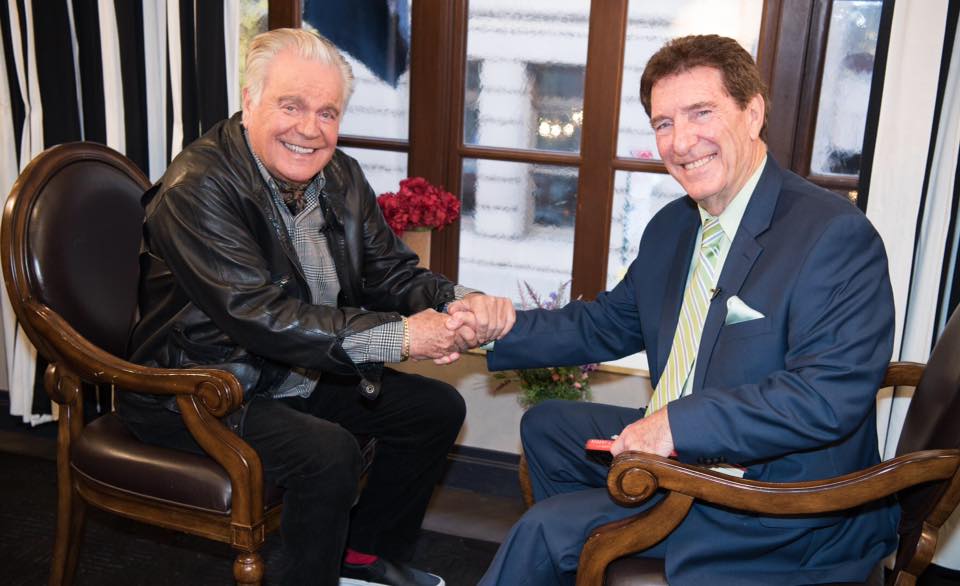Products You May Like
Mickey Burns remains one of the most prolific, essential and relevant television inquirers on the planet after interviewing some of the most illuminating celebrities and personalities during the past 20 years. With a certain swagger and a sense of confidence, Burns hosts NYC Media’s most triumphant show, “Profiles”, a 30-minute thumbnail or capsulization of a particular high profiled celebrity regarding their career and current projects.
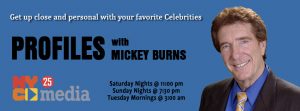
Nearly reaching his 500th show, Burns has had conversations with artists including: Joan Rivers, Smokey Robinson, Joan Collins, Dick Cavett, Tony Orlando, George Foreman, Adam Ant, Isaac Hayes, La Toya Jackson, Taylor Dayne, and countless others. The thing that makes “Profiles” an anomaly is the one on one interview, focusing upon only one particular personality for each show and featuring artists from all walks of life keeping “Profiles” riveting and fresh.
Mickey Burns has also penned a book that he will be unveiling shortly entitled, “From The Projects to Profiles: A Memoir”, which will feature many behind the scene stories but until then, I’ve turned the tables. As Burns has long been my interview guru I had an intimate conversation regarding his career including some heart felt antidotes picked up through the years……
What inspired the genesis of “Profiles?”
I always wanted to be in television. I wanted to be a reporter. I wanted to be a sports caster at one point, but I come from a different time. I come from what I call BC, before cable. So, when I graduated college jobs were very scarce. There were only three networks, and maybe a couple of local channels, not like today where there is a 500-channel universe. I was derailed for a number of years and I was basically teaching and coaching basketball in high school.
Is that what you played in College?
No, I played football. I played on Staten Island in high school and then I earned a football scholarship to a college in the Midwest called Missouri Valley. I received my masters and then came back to New York. It was a great experience. It kept us out of trouble. I would travel to play games in Texas, Nebraska, Iowa, and I got to see a lot because it was the first time I was out of New York City. That was an education just living that lifestyle in itself. When I graduated there were no jobs as most of the sports casters were Ex-NFL players and pro baseball players, like Ron Swoboda who I just had on the show. He went from being a New York Met to sports caster on NBC. So it was very difficult to get your foot in the door. I wasn’t willing at the time to start my career in Boise Idaho which is the normal progression. That’s what you have to do today in broadcasting. Very few people start in New York City. Even Rosanna Scotto made one stop in Atlanta first before coming here. That’s why am just so fortunate to be on the air for 20 years and I haven’t been outside of New York.
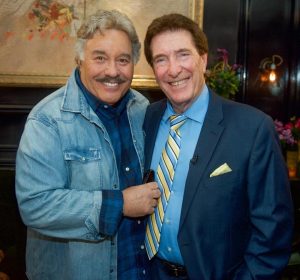
How’d you do it?
Most people have been to Alabama and Virginia and they work their way up to the Big Apple. That’s where I think the cream of the crop and the end destination is. New York is the number one market in the world, and this is where everyone hopes to end up. I wasn’t willing to do that coming out of school. Then interestingly golf was my hobby and one of my high school friends who I played golf with was a cameraman at channel 5. On the weekends we would play golf with John Roland, and Bill McCreary and all these guys. I became very friendly with the people from Fox News locally in the late 70’s, early 80’s. From there they got me in as basically a sound guy doing the 10:00 news. That’s how I first got my foot in the door. It was by accident. Once I got my foot in the door shortly after that Rupert Murdoch took over Fox. When he took over the first thing he did was cut out over time. Most of the guys who are working for Fox especially the camera guys were making $60,000 base pay but they were doubling it in overtime. Most of them panicked because they couldn’t even pay their bills. I had been there a year doing the sound and field producing with Bill McCreary, learning the business. We decided to moonlight and get our own production company on the outside to make up the money we were losing with the overtime. Right off the bat we got a contract with TIME WARNER to do a news magazine called “Special Edition.”
That was fortunate.
I wanted to be a reporter so they told me that I would be the host. After a year of that Time Warner hired me to host another show locally called “Staten Island Live.” I did that for a year at which time Rupert Murdoch gave back the overtime and I was left with what we created. I could’ve either sold the business or kept it going. So, when we were doing “Special Edition” even though it was local, in every episode we would do a celebrity profile. It would only be for four or five minutes but twice a week we would go to Manhattan when we knew there was going to be a celebrity. We would take them aside and get a little interview with them. We did that with Paul Anka, Tony Orlando and people like that. They turned out great but what I realized, there was no way you could interview someone like Tony Orlando for four minutes. So, we were coming back with these great interviews that were 25/30 minutes long, but we can only use four minutes. I thought we needed to do a longform interview with these celebrities because they really wanted to talk about their lives and their careers. They wanted a vehicle to do so. Even when they appear on Jimmy Fallon they get questions like how’s your dog and I like your new movie. That’s it! They very rarely have an opportunity to talk about their lives in depth. I spoke to TIME WARNER and told them that I would like to do another show and they agreed. Then we had two shows going, “Special Edition” and I started doing “Profiles.” We started in Staten Island at the Music Hall Agricultural Center where I did Isaac Hayes, John Amos, and people like that. We would get a limo and drive them down to the Music Hall. That worked out pretty well. Then Bill McCreary who was my mentor called me up and told me that Bloomberg was starting a new network and that we should go speak to them. They were called NYC TV, channel 25 which at the time went out to 6 million people. That was huge. We started with them in 2003 with the singer BJ Thomas. That was the first episode. A few years later channel 25 was being seen by 20 million people in the tri-state area. It had the same demographic outreach as NBC, ABC and CBS.
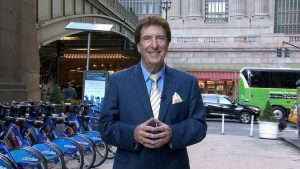
Channel 25?
Regarding Channel 25, I used to kid around and say “that’s a great channel, Oprah wishes she had that channel.” She was on like 325, but it turns out now she’s on channel 22. She finally got what she needed. Now we are approaching our 500th episode.
Do you ever get nervous before you interview someone?
No. I never really have. I don’t know why, but I’ve never gone into an interview where I wasn’t totally prepared. I think that’s what has helped me. I was also a coach and an athlete, so I think my whole life has been in pressure situations, as a player, as a coach and now was an interviewer. I don’t want to sound arrogant or pompous that I don’t get nervous. I’ve been concerned, that’s a better term. Knowing that you’re going to interview people like Dick Cavett, I’m concerned that I’m not going in over my head. Am I going to embarrass myself intellectually? So I would say instead of being nervous, I’m concerned whether I’m going to be able to hold up with these intellectuals. In most cases they are very kind. They allow you to feel that you belong with them.
I guess research is a big part of behind stage preparation?
I remember not too long ago before he won his Academy Award, I interviewed Christopher Plummer. He became the oldest recipient of an Academy Award. He was in his 80’s. Prior to that interview my assistant gave me a folder with research. She insisted that I check out the top link. It was a radio interview and I went to the link and started listening to it. It was a small radio show based in Ohio. The interviewer asked Christopher Plummer a couple of questions. He was doing the interview because of his autobiography and after the third question he asked the interviewer whether or not he read his book. The interview gave his best imitation of Jackie Gleason when he was caught in a lie, and then all you heard was a click. Plummer hung up on him, so I thought I better really get prepared. So, I read the book and when we started off our interview I said, “Mr. Plummer would it be OK if I read a couple of passages from your book?” That was it. That’s why he was there. It was a massive book with 500 pages. Little things like that sometimes make or break a good interview. I have another story for you about when I interviewed Smokey Robinson, who was a fabulous guy. I was warned by his manager that whatever I do I only had 25 minutes, that’s it. I said, “we can live with that.” I had won a putter at a golf tournament and heard that he was an avid golfer but was having trouble with his putting. So before we started the interview I gave him the putter. He was touched. He said he had done 1000 interviews and never gotten anything. So here we are with the interview and we were getting close to the 25 minutes mark, as we did his assistant was in the back like a jumping bean, pointing to the watch. Smokey caught this out of the corner of his eye and stopped the interview. He said, “Sit down, I am talking to my brother Mickey and I’ll tell you when we’re done.”
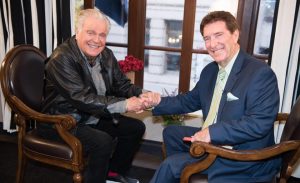
Who do you recall having so much fun interviewing?
Joan Rivers I loved. People don’t realize how smart she was. She was brilliant. I loved George Foreman. He was really entertaining and fun. He really became successful in business after he became the heavyweight champion. He told me that “the only business deal that’s good is when both parties are happy.” He talked about the George Foreman grill. Another guy that was really great was Chuck Barris from “The Gong Show.†He was one of the top executives at NBC in daytime television and that’s when he created “The Gong Show,†“The Newlywed Game” and “The Dating Game.” Those were all his. He started out as an NBC page. In my book the last chapter is the legacy section. The last question that I ask in all 500 episodes is “what do you hope your legacy will be?” We went back into the archives of all the episodes and pulled out the last question and those are in the book. When I asked Chuck Barris what he hoped his legacy would be he said that he wanted it on his tombstone, “Gonged At Last.” It turns out he passed away several years after the interview and I read it in the New York Times that that is what’s on his tombstone.
Who have you not interviewed that you really would like to speak with?
We all have our hit list of people that we want. Number one on my list is Tom Jones. He’s going to turn 80 pretty soon. I did meet him years ago backstage at Westbury Music Fair. I found him to be very shy and reserved at the time. We were sitting and talking about 20 minutes before the concert. Every few minutes he would get up and peak out of the door to see if the venue was filling up, almost like he was a little insecure, totally different from his on-stage persona. At the time he was working all the time. I asked him why he worked so hard. I wondered if he was concerned that the workload would take a toll on him and on his voice. He looked me right in the eye and said “Mickey I’m smart enough to realize that nothing lasts forever. I realize how lucky I am that people will come out every night and watch me perform. I’m going to do this as long as it will fill up the seats.” And he’s still doing it. Then I had his friend Engelbert Humperdinck on regarding his autobiography. He had written something about his promiscuity in it. I said “you wrote that you made love to over 3000 women, is that accurate?” He laughed and he said “let me put it to you this way, less work for my wife.”
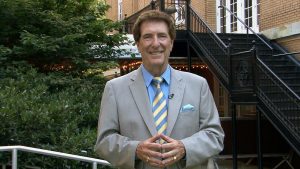
My own personal favorite, and one of my best interviews was Adam Ant as I’m a massive Adam Ant fan. I know you also interviewed him. What was that like for you?
He looked like Johnny Depp. He had this pirate costume on. I thought he was out there. I had read that he had some problems for a period of time. He was huge at one point. He was very honest and he was very giving. I thought it was a great episode. I liked him very much.
What’s the name of your book?
It’s called “From the Projects to Profiles: A Memoir.” I grew up in the housing projects on Staten Island. Back in those days the one thing we had in common was nobody had any money. But, it was a great childhood. It was a great foundation for later in life. You learned a lot of things. I talk about that in my book. Nobody taught us confidence, we learned it.
If you could have me ask you any question in the world, what would you want me to ask you?
That’s a tough question. You might want to ask me what I hope my legacy is.
Mickey, what do you help your legacy will be?
I just hope that after my 500 episodes over 20 years that we’ve entertained people, that we’ve educated people, and most importantly along the way that maybe we have inspired people to be better.
